Suzanne Collins’s Hunger Games series has often been compared to Stephenie Meyer’s Twilight novels, primarily because both center on a young female protagonist and has become a phenomenon for their shared young-adult demo. But the sense of familiarity of The Hunger Games goes much further back, recalling everything from William Golding to Phillip K. Dick to even Stephen King. Although it has been a while now since the last installment of the Hunger Games was released, I decided it wouldn’t hurt to draft up this list for those of you who may miss the movies. Here are 12 films that come highly recommended, and should be essential viewing for any fan of the franchise.
****
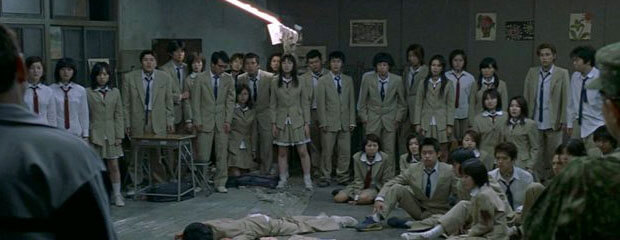
1. Battle Royale
Written and directed by Kinji Fukasaku
Japan, 2000
The concept of The Hunger Games owes much to Koushun Takami’s cult novel Battle Royale, adapted for the cinema in 2000 by Kinji Fukasaku. The film is set in a dystopian alternate universe, in Japan, with the nation utterly collapsed, leaving 15 percent unemployed and 800,000 students boycotting school. The government passes something called the Millennium Educational Reform Act, which apparently provides for a class of ninth-graders to be chosen each year and pitted against one another on a remote island for 3 days. Each student is given a bag with a randomly selected weapon and a few rations of food and water and sent off to kill each other in a no-holds-barred fight to the death. With 48 contestants, only one will go home alive. Yes, this has been often cited as the original Hunger Games; whether or not Suzanne Collins borrowed heavily from Fukasaku’s near-masterpiece or the novel is ultimately unknown. In the end, it doesn’t matter since art has always imitated art. The fact is, both films share the same premise, but stand at opposite ends in tone, style, genre, and narrative shape.
Battle Royale is part exploitation, part teen angst drama, part black comedy, and part survival thriller. This is about as bleak and cruel as they come, but it remains endlessly entertaining. Fukasaku’s direction is far from subtle, but like all great films, Battle Royale has something to say. This is a harsh critique and a darkly funny satire of a wide array of elements of modern Japanese society. Think of it as a cross between reality TV with Lord of the Flies. The targets of satire vary: there is the unsettling social commentary on our tolerance for violence and thoughtless self-preservation, Japan’s obsession with authority and obedience, how adults place far too much pressure on their children’s educational achievements and the obsession with violent video games and anime. But put aside the social commentary: Battle Royale is downright cartoonish, hilarious, and exciting. Even during the deliberately provocative violent teen-hunts, Fukasaku maintains the right tone, never slipping into seriousness or preachiness.
Battle Royale aroused international controversy and was either banned or excluded from distribution in many countries, yet it became a domestic blockbuster and is one of the 10-highest grossing films in Japan. It received near-universal acclaim and gained further notoriety when Quentin Tarantino was quoted as saying he wished he had directed the movie himself.

2. Lord of the Flies
Directed by Peter Brook
Written by Peter Brook and William Golding
UK, 1963
Peter Brooks’s big-screen adaptation of the Nobel Prize-winning author William Golding’s classic Lord of the Flies adheres so closely to the spirit of the source material that at every turn, Brook captures the cruelty and fascination of Golding’s symbols and metaphors perfectly.
Following a plane crash, 30 British school-age boys find themselves deserted on an island and try to govern themselves, with disastrous results. As with Golding’s book, human nature and individual welfare versus the common good are themes explored within the film. Even when innocent children (much like in The Hunger Games) are placed in isolation, fear, hate, and violence are inherent.
The film was shot in black-and-white and on a shoestring budget, with an entirely non-professional cast, and neither cinematographers Gerald Feil nor Tom Hollyman had never been behind a movie camera before. The casting of amateur actors required intensive overnight rehearsals and improvised dialogue, and the extensive editing took nearly 2 years to complete – the majority of which was spent fixing the sound due to the continual crashing of the ocean waves. All of this would in most cases be unfavorable for a motion picture, but here, it somehow lends to the natural aspect of the film, heightening its raw intensity. Its a miracle that Brooks not only got the job done but directed such an unsettling film, that brings out Darwin’s theory of “the survival of the fittest” to its darkest light. If Piggy doesn’t win your heart, you have none.
Note. The story was adapted with less success in 1990, and so this version is recommended instead.
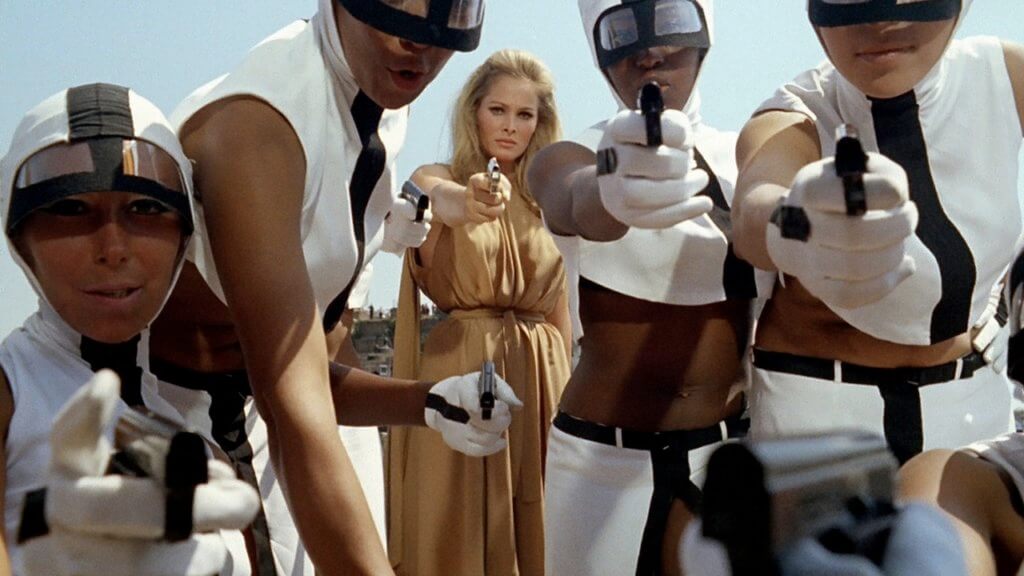
3. The 10th Victim (La Decima Vittima) (The Tenth Victim)
Directed by Elio Petri
Written by Tonino Guerra, Giorgio Salvioni, Ennio Flaiano, and Elio Petri
Italy,1965
The 10th Victim was the first film to offer up the concept of a TV show wherein people hunt and kill one another for sport. It also expanded the idea into a satire on game shows. In the 21st century, the government and the private sector have joined forces to create a solution to crime by giving it a profitable outlet titled “The Big Hunt,” a popular worldwide game show in which contestants are chosen at random to chase one another around the world in a kill or be killed scenario. The winner of the first round moves on to the next. After ten wins, a player is retired from the game and gets a cash prize of one million dollars, but very few make it that far. As in The Hunger Games, there are sponsors who give contestants bonuses for quoting their slogans on camera, making product placement the ultimate form of media violence here.
Directed by Elio Petri, this campy futuristic satire of commercialism, violence, and dehumanization has earned a cult following among film buffs and with good reason. It stars Marcello Mastroianni and Ursula Andress at the height of their stardom, and they share remarkable onscreen chemistry, running about in one of the most bizarre curiosity pieces of ’60s Italian cinema. Groovy and ridiculously satirical, the film clearly lent much inspiration to many films to follow, most notably, the Austin Powers franchise. The Italian pop and jazz score; the outrageous sixties chic fashions; the ultra-modern sets (that recall films like Danger: Diabolik); the less than subtle anti-media agenda – all help make The 10th Victim a truly one of a kind experience. Petri directs with tongue firmly in cheek, and although it doesn’t quite hold together in the final reels, it is something you will never forget. This interesting pop artifact features a number of easily spoiled memorable scenes. You want to seek this one out.
Note. The film was based on The Seventh Victim, a 1953 short story published in Galaxy magazine by prolific sci-fi writer Robert Shakley.
4. The Running Man
Directed by Paul Michael Glaser
Written by Steven E. de Souza
USA, 1987
Directed by former Starsky and Hutch star Paul Michael Glaser, this post-apocalyptic science fiction yarn starring Arnold Schwarzenegger is without a doubt the most mainstream film to appear on this list. Much like The Hunger Games, The Running Man satirizes American entertainment, deriding everything from professional wrestling to reality TV and game shows. The film, which is loosely based on a novel by Richard Bachman (a pen name for Stephen King), is set in the totalitarian America of 2019, wherein convicted criminals are forced to take part as bait in a hideous TV manhunt called, yes, The Running Man. Schwarzenegger stars as Ben Richards, a cop framed for massacring rioting civilians during a protest and later picked as a contestant for the show, where he must survive a gang of skillful assassins like Subzero (Prof. Toru Tanaka) and Captain Freedom (Jesse Ventura), each armed with unique weapons. Think American Gladiators mixed with WWE, Let’s Make a Deal, Max Headroom, and The Most Dangerous Game.
Admittedly, the commentary on America’s preoccupation with violence as well as game shows is heavy-handed, but what is most obvious is a set of double standards present. On one hand, it has a plot that harshly criticizes a society that keeps the masses at peace with televised ultra-violence (like The Hunger Games); on the other, the filmmakers revel in the violence, showing little interest in exploring any intellectual commentary. Yes, The Running Man is brainless and somewhat dated, but it is still a must-see if only for the onscreen combo of Jim Brown and Schwarzenegger kicking ass. Also on display is Paula Abdul’s dance choreography, long before her days on American Idol.
 5. The Most Dangerous Game
5. The Most Dangerous Game
Directed by Irving Pichel and Ernest B. Schoedsack
Written by James Creelman
USA, 1932
The Most Dangerous Game was made in 1932, in the era known as “Pre-Code Hollywood,” a time when filmmakers were able to get away with sexual innuendo, illegal drug use, adultery, abortion, intense violence, homosexuality, and much more. It was during this time that a film like The Most Dangerous Game was allowed to be made and shown to the general public without fear of censorship.
This was the first of many official and unofficial screen versions of Richard Connell’s short story of the same name. The film was put together by producer Willis O’Brien while in pre-production on King Kong and features several of the same cast and crew members, as well as props and sets from Kong. Despite these obvious cost-cutting measures, Dangerous Game never feels like a second-rate production and features impressive effects, moody cinematography, smart dialogue, and fine acting.
Running a lean 63 minutes, the film is constructed with hardly an ounce of fat, and the filmmakers waste no time, establishing the basic premise within the first 5 minutes. The plot concerns a big game hunter on an island who chooses to hunt humans for sport. The Most Dangerous Game might be a mindless action movie but remains a genuine classic. Many people have remade the story, some more successful than others, but none has matched the level of craft on display here.
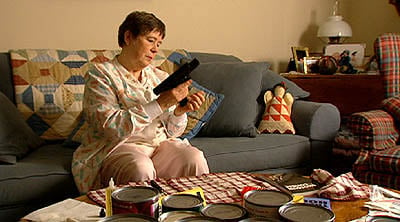
6. Series 7: The Contenders
Written and directed by Daniel Minahan
USA, 2001
This film is imperfect, bu it deserves some mention simply because its timing was impeccable. The movie was filmed before the first airing of a Survivor episode and seemed more radical when first released. The film centers around The Contenders, a Survivor-style show depicted within the film, in which six contestants are set loose in the same Connecticut community, with orders to kill each other. Series 7 marked the directorial debut for Daniel Minahan, who previously tackled pop culture and America’s obsession with violence in his script for I Shot Andy Warhol and later would go on to direct episodes of hit TV shows such as Game Of Thrones and True Blood.
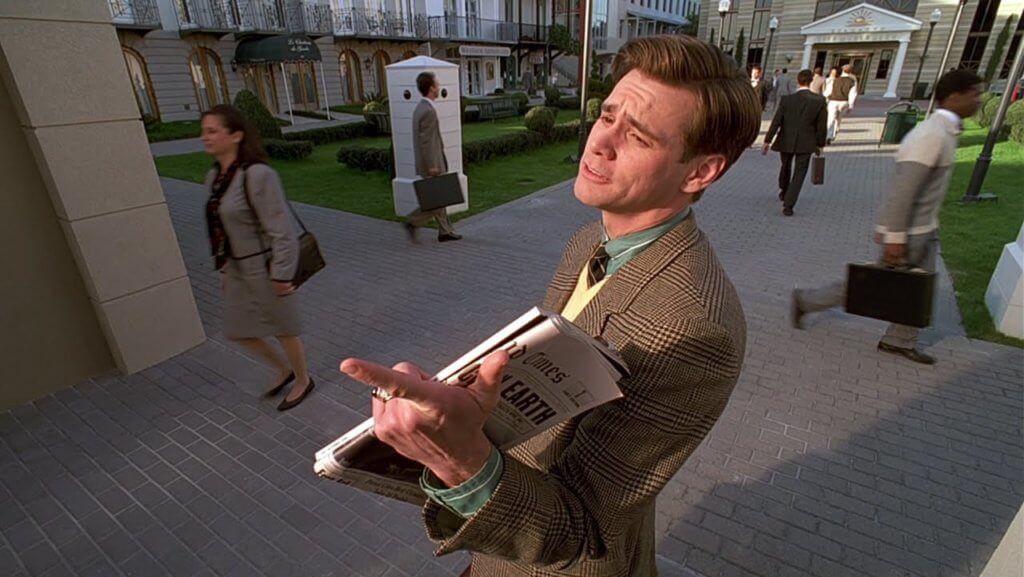 7. The Truman Show
7. The Truman Show
Directed by Peter Weir
Written by Andrew Niccol
USA, 1998
Apart from the obvious deathmatch featured in The Hunger Games, the film’s text is thematically provocative, its allegorical elements highlighting the way the “Games” amplify today’s obsession with reality television. Perhaps one of the greatest cinematic commentaries on all-pervasive media manipulation is in Peter Weir’s The Truman Show, starring Jim Carrey. For Carrey detractors, The Truman Show proves his talent reaches far beyond physical humour. Carrey remains in complete control throughout, commanding and exhibiting the charm and charisma needed for a role that calls for much sympathy and likeability.
Truman Burbank lives a happy life, but what he doesn’t know is that his life is completely manufactured within a giant domed television studio. He’s been the focus of a reality TV show ever since his birth; filmed, observed, scrutinized every second of his life. He’s the star, his hometown is a giant set piece, and even his family and friends are actors. Only he doesn’t know it. Not yet.
The paranoid ingeniousness of The Truman Show brings to mind 1984, as Carrey turns Truman into a postmodern Capra hero. While the film features no fight-to-the-death tournaments, it is the most dispiriting film featured on this list. We are desperate for Truman to break through Seahaven’s fourth wall and for the first time in his life actually come alive and become a true man. This funny, sweet, and thought-provoking parable about privacy and voyeurism is a must-see.

8. Le Prix du danger (The Prize of Peril)
Written and directed by Yves Boisset
France, 1982
Le Prix du danger takes place in a futuristic society where contestants pit their survival skills against each other in a fight to the death for cash prizes on a popular TV program. Sound familiar? Based on a novel by Robert Sheckley, who wrote the source material for the 10thVictim, the short story is noted for its plot, which predates reality television by several decades. Much like The Running Man (which it clearly inspired), there is a charismatic game show host and an unarmed contestant who slowly wins the approval of the audience. Unlike The Running Man, the film does a better job at exploring the sociological repercussions of gladiatorial combat for the televised masses and is far more interested in debating the ethics of the sport. Not a huge hit on its release, Le Prix Du Danger boasts a refreshingly downbeat ending in contrast to many other films of its kind in which the hero rises above the odds and triumphs. Also, worth noting is the satirical commercials aired during the show, an idea that was borrowed by Paul Verhoeven later on. The film stars famous French actors Gérard Lanvin and Michel Piccoli.

9. Louis 19, le roi des ondes (Louis the 19th, King of the Airwaves)
Directed by Michel Poulette
Written by Sylvie Bouchard and Émile Gaudreault
Canada, 1994
Louis always dreamed of being a TV star, so he enters and wins a contest in which a documentary film crew follow his daily life for three months. The only problem is that Louis lives a rather dull life, and so the TV execs decide to inject some much-needed excitement to boost their ratings. If the plot sounds all too familiar, it is because the film was later remade in America as EdTV.
The film isn’t anywhere near as brilliant as The Truman Show, but nowhere near as generic as EdTV either – and being a native of Montreal, I just couldn’t go without mentioning it. Quebecers may take pleasure in the various cultural references and countless cameos, but the rest of the world may find themselves lost or even somewhat bored. The film won the Claude Jutra Award for the best feature film by a first-time Canadian film director, and the Golden Reel Award for the year’s top-grossing film. It was also a nominee for Best Motion Picture, ultimately losing to Exotica.
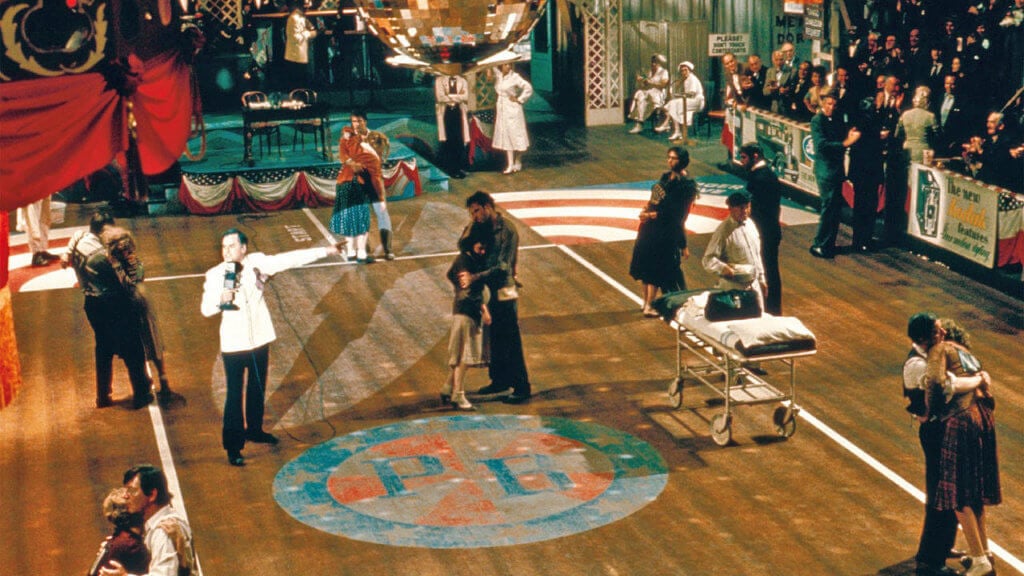
10. They Shoot Horses, Don’t They?
Directed by Sydney Pollack
Written by James Poe and Robert E. Thompson
USA, 1969
They Shoot Horses, Don’t They? is a wildly acclaimed 1969 American drama directed by Sydney Pollack that went on to receive nine Academy Award nominations. Like most of the films to appear on this list, it is based on a novel, a 1935 tome by Horace McCoy. Penned by James Poe and Robert E. Thompson, the film is an allegorical drama set amongst the contestants in a marathon dance contest during the Great Depression.
So how does a movie revolving around a dance competition relate to The Hunger Games? Much like The Hunger Games, the participants (all teens) are broken down into couples in hopes of winning and taking home the prize money, cash that’s much needed during such hard economic times. There is even a sleazy opportunistic MC who urges them on to victory and corporations who will sponsor participants who catch their attention. They Shoot Horses does an excellent job exploring a wretched event that caters to the wealthy and uses the underprivileged to provide entertainment. “People are the ultimate spectacle,” as the tagline reads.
As the marathon winds into a staggering second month, suspicion, doubt, and insecurity rage among the competitors, bringing out the worst in everyone. The tension builds as the dancers self-destruct and begin to fight among themselves, eventually leading to a shocking crime.
They Shoot Horses, Don’t They? is a tour de force of acting. Jane Fonda offers the first sign that she inherited her dad’s talent, proving herself as a serious dramatic actress. She went on to receive universal praise, as well as an Oscar nomination for Best Actress, and Gig Young won his Oscar for his superb performance as the slimy promoter. Pollack does some of his best work directing this fascinating film. From the start, the movie’s arc heads only downwards to an appropriately bleak ending. Take this as a warning – this movie goes out of its way to deny the audience any moments of pleasure.

11- Turkey Shoot (Escape 2000)
Directed by Brian Trenchard-Smith
Written by Jon George and Neill D. Hicks
Australia, 1982
Saving the craziest for last; here is Brian Trenchard-Smith’s Turkey Shoot, aka Blood Camp Thatcher, aka Escape 2000. Turkey Shoot is so cynical, cheap, tasteless, violent, exploitative, and ludicrously over-the-top that none of the original cast or crew members were willing to defend the pic for Mark Hartley’s documentary on Australian genre film, Not Quite Hollywood.
Once again inspired by The Most Dangerous Game, Turkey Shoot is set in an Orwellian future – a fascistic Australia, to be exact, in where a group of criminals and rebels are sent to the draconian Camp 47 and reprogrammed through a strict regimen of abuse, torture, and rape as a means of social rehabilitation. It may sound like a brutal, darkly nihilistic film, but it also helps that the movie never treats itself too seriously. The prison film/totalitarian future background is only an excuse for vast amounts of blood and gore, and in lieu of the reputation that precedes it, it’s impossible for any exploitation/horror aficionado to pass it up. The sum total of political commentary runs to naming the camp’s commander Thatcher – and that’s about it. This is purely a sadistic mélange of over-the-top action set-pieces and ultra-violent sensationalism. In other words, the perfect guilty pleasure for the midnight slot.
Note. Brian Trenchard-Smith went on to direct low-brow classics BMX Bandits, The Man From Hong Kong and Dead-End Drive In.
12 – The Human Race
Directed by Paul Hough
Written by Paul Hough
2013, USA
Writer/director Paul Hough (son of Legend of Hell House director John Hough) burst into the scene with his unforgettable documentary The Backyard in 2002, followed by his award-winning short film The Angel. In 2012, he released the startling and violent The Human Race, a blood-soaked, sci-fi/action/horror with a solid focus on characterization and moral choice. The premise is simple; People are snatched from their everyday lives and forced to compete against one another in a competition that’s like a mixture between Battle Royale, The Hunger Games, and The Amazing Race. If contestants stray off course, they die. If they step on the grass, they die. And if they are lapped twice, they die. Every individual must fight to survive until only a single survivor remains alive. As for the contestants, anyone can be chosen to participate regardless of sex, ethnic backgrounds, religious beliefs, age, and physical capacities. It doesn’t matter if you’re missing a leg or pregnant; every character is put through the wringer and no one is spared. For starters, the charismatic lead is played by Eddie McGee, a real-life amputee who brawls and executes stunts on one leg. In addition, there are also two characters who are deaf and who communicate in prolonged intense dialogue sequences conveyed solely through subtitled sign language. There is also an elderly man who can barely run, and even a pregnant woman in her second trimester. When an uplifting storyline involving cancer survivor is cut short in cruel fashion; the tone of Hough’s film becomes crystal clear. Hough constantly introduces elements that would normally be used as manipulative devices in most films, but here he annihilates them without batting an eyelash. The Human Race mixes sci-fi and horror elements to examine the best and worst of human nature. But despite the above comparison to Battle Royal and Hunger Games, this thought-provoking feature is probably closest in mood to Sydney Pollack’s 1969 dance-marathon drama They Shoot Horses, Don’t They?. And that my friends are the highest compliment I can give.































